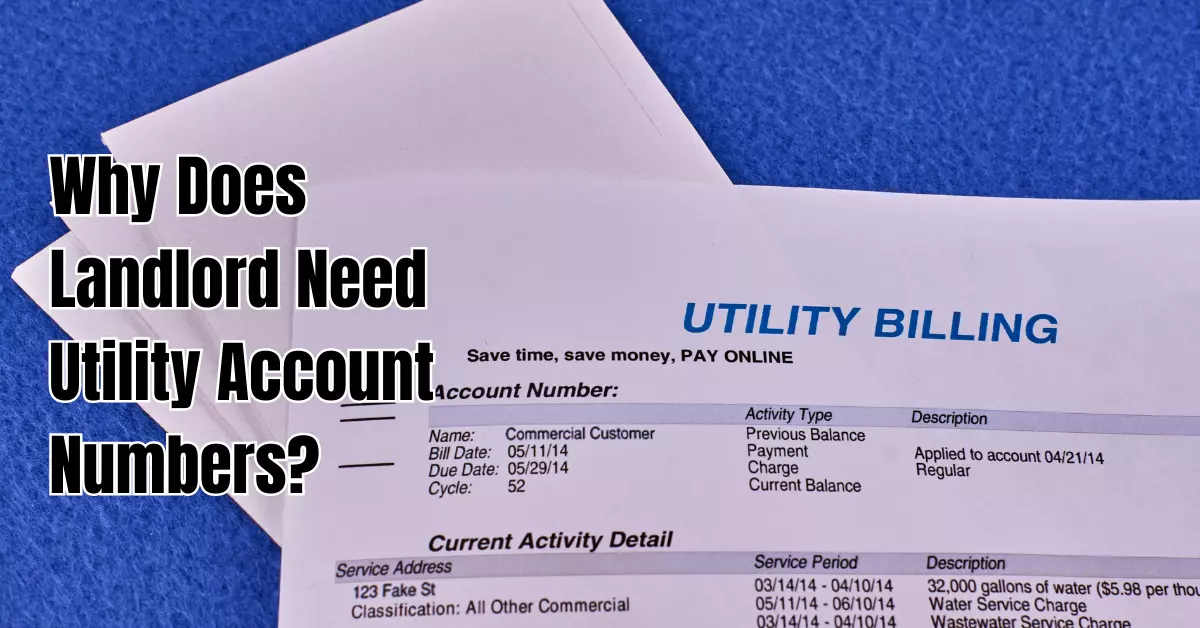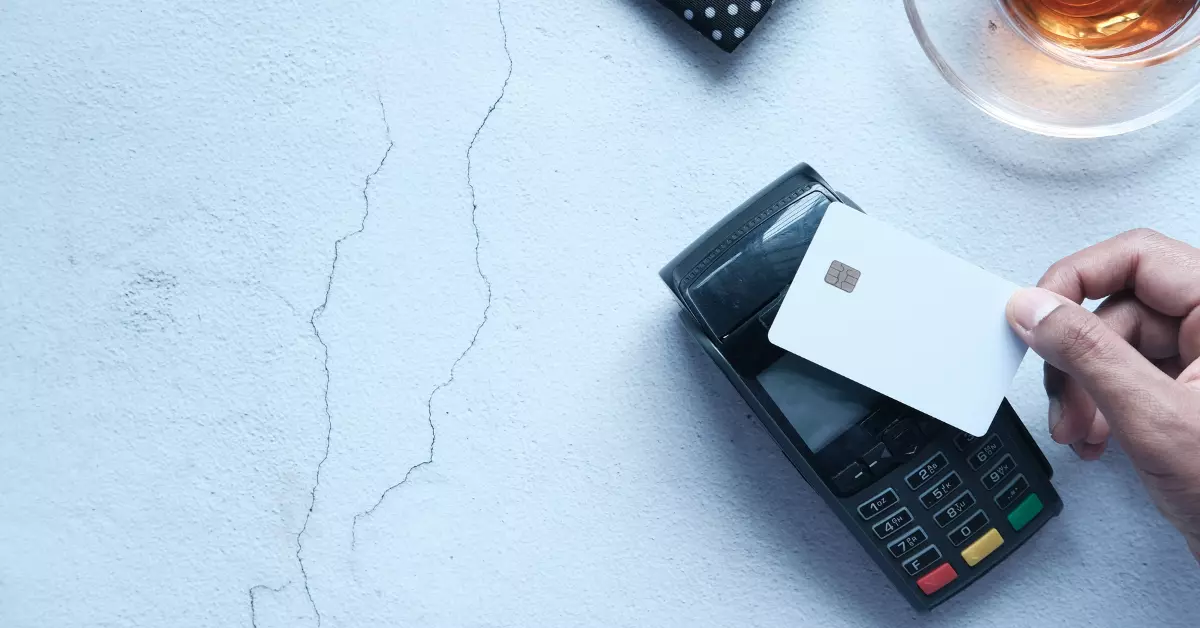Why Does Landlord Need Utility Account Numbers?
Landlords need utility account numbers to transfer the responsibility of paying for utilities to the tenant. This ensures the tenant pays for their own utilities and not the landlord.
This practice protects the landlord from incurring unpaid utility bills and helps to ensure the expenses related to utilities are paid for by the tenant.
In this article, we will explore the reasons why landlords need utility account numbers and what tenants should expect during the process. We will also touch on how this information can be used to benefit both parties involved.

The Importance Of Providing Your Tenant’S Utility Account Number
As a landlord, it’s essential to keep track of your tenants’ utility account numbers. But why is it so important?
Let’s explore the reasons behind it and the consequences of not doing so. Let’s dive into the importance of providing your tenant’s utility account number.
Understanding The Role Of Utility Account Numbers
Utility account numbers help landlords identify who is responsible for paying the utility bills in their rental property.
When tenants move into a new property, they need to get their utility bills set up in their name. This ensures that the landlord is not responsible for paying these bills.
Utility companies use unique account numbers to keep track of each tenant’s usage and bill payments. As a landlord, having these numbers on file can be helpful when addressing issues related to utility payments or usage.
Consequences Of Not Collecting Utility Account Numbers
Failing to collect or keep track of tenant utility account numbers can lead to problems. Some potential consequences include:
- The landlord may be held liable for unpaid utility bills if the tenant defaults on payment.
- Billing disputes may arise without a clear record of who is supposed to pay for a specific utility.
- In the event of property damage caused by neglect or misuse of utilities, the landlord may be unable to prove the tenant’s responsibility.
Benefits Of Collecting The Tenant’S Utility Account Number
Collecting tenant utility account numbers allows landlords to have a better understanding of their tenant’s finances and resource usage. Here are some benefits of doing so:
- Landlords can accurately determine a tenant’s monthly utility payments as well as any changes in usage. This can help with budgeting and long-term planning.
- Collecting tenant utility account numbers can prevent confusion and disputes between landlords and tenants over who is responsible for paying utility bills.
- Keeping track of tenant utility account numbers ensures that the landlord can contact utility companies in case of emergency repairs or maintenance.
Collecting and keeping track of tenant utility account numbers is critical for landlords. Not only does it help ensure that rental properties stay well-maintained, but it also prevents disputes and false billing claims between tenants and landlords.
As a responsible landlord, make sure to request and keep track of your tenant’s utility account numbers.
How To Request Tenant’S Utility Account Numbers?

Legal Considerations To Ensure Compliance
As a landlord, requesting your tenant’s utility account numbers is crucial to ensuring that your property operates smoothly.
However, it’s important to ensure that you are on the right side of the law when requesting the information. Here are some legal considerations that you need to make sure you comply with when requesting utility account numbers from tenants:
- Always double-check local and state laws before requesting utility account numbers. Many states have specific laws and regulations that landlords must comply with when requesting this information.
- Make sure to include a written request for the tenant’s utility account numbers in the lease agreement.
- Ensure that the tenant’s utility account information is kept confidential and only used for operational purposes.
- Be aware of the penalties for misuse or unauthorized dissemination of the utility account numbers.
Best Practices For Requesting Utility Account Numbers
Requesting utility account numbers from tenants can be a simple process as long as you follow best practices.
Here are some tips to follow to help you request your tenant’s utility account numbers in the most efficient way possible:
- Include a separate section in the lease agreement that outlines how you will use tenant utility account numbers for property management purposes.
- Explain why to the tenant that you need their utility account numbers. Some tenants may be hesitant to provide this information, so clearly outlining your reason for the request can help alleviate any concerns.
- Have a clear process for securing the tenant’s utility account numbers, and ensure that your staff has been properly trained to handle the information.
- Take steps to secure the tenant’s privacy and protect their personal information by explaining how their utility data is shared, who has access to it, and why.
Approaches To Obtaining Utility Account Numbers
Landlords can approach the task of obtaining utility account numbers in a few different ways. Here are some common approaches that landlords can use to obtain their tenant’s utility account numbers:
- Directly ask tenants for their utility account numbers. This can be done in person or in writing. It’s important to explain why the information is needed and how it will be used.
- Include a clause in the lease agreement that requires tenants to provide their utility account numbers.
- Contact the local utility company directly and request the information from them.
- Use software that automates the process of requesting tenant’s utility account numbers. This can simplify the process while ensuring compliance and security.
Steps To Take Once You Have Tenant’S Utility Account Numbers
As a landlord, having your tenant’s utility account numbers is an important part of the rental process. It helps you to streamline your payment process, ensure payment of bills, and avoid any unnecessary expenses.
Once you have the tenant’s utility account numbers, there are some important steps you should take to ensure a smooth payment process.
How To Verify Utility Account Numbers
Before anything else, it is important to verify that the utility account numbers provided by your tenants are accurate. Here are some steps to take to ensure that the account numbers are correct:
- Reach out to the utility company directly to confirm the account information.
- Double-check the information against the latest bill provided by the utility company to the tenant.
- Cross-reference the information provided by the tenant with public utility information databases.
Setting Up Payment Processes Based On Utility Account Numbers
Once you have confirmed the utility account numbers, you can begin setting up payment processes based on this information. Here are some steps to take:
- Create a system to keep track of utility bills and payment due dates.
- Establish the preferred payment method with your tenant, such as automatic bank transfer, check, or online payment systems.
- Set up automatic payments, if possible, to avoid missed payments and late fees.
- Provide the tenant with receipts or proofs of payment to ensure transparency in the payment process.

Streamlining Utility Payment Process With Tenants
By having your tenant’s utility account numbers, you can simplify the payment process for both you and your tenant. Here are some steps to take to ensure a hassle-free process:
- Consider including the utility payments into rent charges, if your tenant agrees to it.
- Develop a clear and concise utility payment policy that outlines responsibilities and expectations for both parties.
- Respond promptly to any utility queries or disputes raised by your tenant.
- Conduct regular inspections to ensure there are no gas, water or energy leaks that may result in unnecessarily high utility bills.
Proper management of utility account numbers helps landlords to stay organized, maintain better communication with tenants, and avoid undue expenses and difficulties.
By adhering to the above steps, you’ll be sure to develop a smooth payment process that benefits everyone involved.
Frequently Asked Questions On Why Does Landlord Need Utility Account Numbers?
Why Do Landlords Require Utility Account Numbers?
Utility account numbers help landlords verify that tenants pay their utility bills on time and ensure that accounts are not in default.
What Utilities Might Landlords Require Account Numbers For?
Landlords typically require utility account numbers for services such as electricity, gas, water, sewage, and trash removal.
Can Landlords Check Utility Bills For Tenants?
Landlords can check tenants’ utility bills if the lease agreement allows it and if they have the tenants’ consent or a court order.
Can Tenants Refuse To Provide Utility Account Numbers?
Tenants may refuse to provide their utility account numbers, but landlords may also refuse to rent to tenants who do not provide them.
Conclusion
Wrapping up, as a landlord, having utility account numbers is your ticket to smoother property management. It lets you track bills, avoid unpaid utilities, and ensure that transitions between tenants are seamless.
Remember, staying in the loop of your property’s utilities is as essential as collecting rent.
Reference
https://raleighnc.gov/doing-business/landlord-utility-billing-program